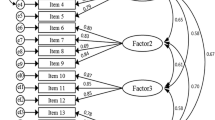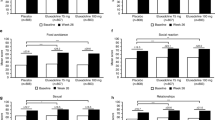Abstract
The Global Improvement Scale (GIS) assesses multiple irritable bowel syndrome (IBS) symptoms using a patient-defined 7-point Likert scale ranging from symptoms substantially worse to substantially improved. To evaluate the scale as an efficacy end point, data were collected from two 12-week randomized, double-blind, placebo-controlled studies of female nonconstipated IBS patients. GIS responders were defined as having substantial or moderate improvement in IBS symptoms. GIS responders had more days with satisfactory control of urgency, firmer stools, fewer stools per day, and fewer days with incomplete evacuation compared to nonresponders. Substantially more GIS responders (90% and 89% in studies 1 and 2, respectively) were satisfied or very satisfied with their treatment overall compared to nonresponders (13% and 11%) ( r = 0.8 in both studies). GIS responders had greater satisfaction with medication relief of pain and discomfort and the time needed to return to usual activities. Favorable correlations between GIS and work and nonwork productivity losses were observed. Correlation of the GIS measure with IBS clinical end points establishes the validity of the GIS for measuring improvement in IBS symptoms. The GIS may be useful in assessing the efficacy of IBS interventions in future clinical trials.
Similar content being viewed by others
References
Russo MW, Gaynes BN, Drossman DA: A national survey of practice patterns of gastroenterologists with comparison to the past two decades. J Clin Gastroenterol 29(4):339-343, 1999
Thompson WG, Heaton KW, Smyth GT, Smyth C: Irritable bowel syndrome in general practice: prevalence, characteristics, and referral. Gut 46(1):78-82, 2000
Everhart J, Renault P: Irritable bowel syndrome in office-based practice in the United States. Gastroenterology 100:998-1003, 1991
Northcutt A, Harding J, Kong S, Hamm T, Perschy T, Heath A, Dukes G, McSorley D, Mangel A: Urgency as an endpoint in IBS. Gastroenterology 116:A1036, 1999
American Gastroenterological Association: The Burden of Gastrointestinal Diseases. http://www.gastro.org/pdf/burden-report.pdf. 2001
Thompson WG: Irritable bowel syndrome: a management strategy. Baillieres Best Pract Res Clin Gastroenterol 13(3):453-460, 1999
Camilleri M: Management of the irritable bowel syndrome. Gastroenterology 120(3 special issue):652-668, 2001
Spiller RC: Problems and challenges in the design of irritable bowel syndrome clinical trials: experience from published trials. Am J Med 107(5A):91S-97S, 1999
Veldhuyzen van Zanten SJ, Talley NJ, Bytzer P, Klein KB, Whorwell PJ, Zinsmeister AR: Design of treatment trials for functional gastrointestinal disorders. Gut 45(suppl 2):II69-II77, 1999
Thompson WG, Longstreth GF, Drossman DA, Heaton KW, Irvine EJ, Muller-Lissner SA: Functional bowel disorders and functional abdominal pain. Gut 45(suppl 2):II43-II47, 1999
Lembo T, Wright RA, Bagby B, Decker C, Gordon S, Jhingran P, Carter E: Alosetron controls bowel urgency and provides global symptom improvement in women with diarrhea-predominant irritable bowel syndrome. Am J Gastroenterol 96(9):2662-2670, 2001
Harding JP, Hamm LR, Ehsanullah R, Heath AT, Sorrells SC, Haw J, Dukes GE, Wolfe SG, Mangel AW, Northcutt AR: Use of a novel electronic data collection system in multicenter studies of irritable bowel syndrome. Aliment Pharmacol Ther 11(6):1073-1076, 1997
Hollander M, Wolfe D: Nonparametric Statistical Methods. New York, John Wiley & Sons, 1973
Gralnek I, Hays R, Kilbourne A, Naliboff B, Mayer E: The impact of IBS on health-related quality of life. Gastroenterology 119:654-660, 2000
Corney R, Stanton R: Physical symptom severity, psychological and social dysfunction in a series of outpatients with irritable bowel syndrome. J Psychosom Res 34:483-491, 1990
Hahn BA, Kirchdoerfer LJ, Fullerton S, Mayer E: Patient-perceived severity of irritable bowel syndrome in relation to symptoms, health resource utilization and quality of life. Aliment Pharmacol Ther 11(3):553-559, 1997
Jaeschje R, SInger J, Guyatt G: A comparison of seven-point and visual analog sclaes. Control Clin Trials 11:43-51, 1990
Klein K: Controlled treatment trials in the irritable bowel syndrome: a critique. Gastroenterology 95(1):232-241, 1988
Rights and permissions
About this article
Cite this article
Gordon, S., Ameen, V., Bagby, B. et al. Validation of Irritable Bowel Syndrome Global Improvement Scale: An Integrated Symptom End Point for Assessing Treatment Efficacy. Dig Dis Sci 48, 1317–1323 (2003). https://doi.org/10.1023/A:1024159226274
Issue Date:
DOI: https://doi.org/10.1023/A:1024159226274




